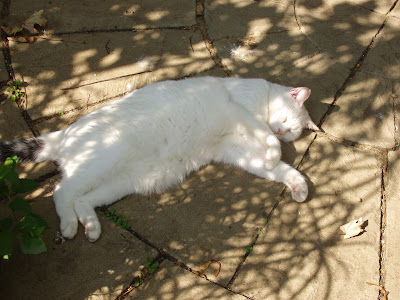Dental Health, Sleep and Dementia
(This article is largely an exercise in commonsense and did not need a medical expert to get it written.)
This is a link to an article by Eli Wolfe on the California Magazine website, about a study into the relationship between sleep and Alzheimer's Disease conducted by Prof. Bryce Mander (neuroscientist) of U.C. Berkeley and his co-leader, Prof. William Jagust (an expert on Alzheimer’s.) The article also contains (positive) comments by Prof. Douglas Galasko of U.C. San Diego, who was not involved in the study itself.
It is well worth a read, both in the limited context of this article and because it also gives ordinary readers of this blog a start on understanding what the mechanism behind Alzheimer's is, which will be helpful once we get onto discussing different, more direct ways in which dental infections etc. may trigger or aggravate dementia. (There are other types of dementia with different mechanisms; vascular dementia for example.)
Basically, the study found that regularly getting insufficient sleep made it harder or impossible for the brain's natural processes to control the accumulation of beta-amyloid in brain tissue, which in turn made it ever harder for subjects with poor sleep patterns to sleep well. At the time the study was done, beta-amyloid aggregations in the brain were widely suspected of being the basic cause of Alzheimer's Disease: the blog author believes this is now generally accepted to be true.
Prof. Mander cautions against using sleeping pills (or presumably other chemical blackout juice, like absinthe*) to achieve good sleep patterns, because they may actually make things worse. (The blog author would add that "zonked out" and "restfully asleep" are different conditions, and one seldom rises from a chemically-induced stupor feeling refreshed or in any way actually better.) The researchers advocate regular exercise as the best route to regular sleep. That advice has been repeated from many other quarters and is sound, so far as it goes. But what happens if a subject has poor dental health: gum disease, a dental infection, even an untreated abscess or a bite-misalignment causing severe inflammation around the jaw joints, as was the blog-author's experience a few years ago?
The short answer is that they won't sleep so well if they have toothache from a small dental infection -and they may well routinely take over the counter anti-inflammatories in order to sleep at all. If they do not receive dental treatment, they will progress to stronger painkillers, including opiates. Likewise, if they have a minor bite misalignment, that won't just be uncomfortable of itself: they will suffer from digestive upsets due to poorly-chewed food, which will wake them up.
If they have gum disease leading to inflammation, the same sort of thing applies.
If they have an abscess, or a badly misaligned bite, then they probably won't sleep very much at all. In the blog-author's case, inflammation around his jaw joints got steadily worse when he lay down to sleep, and the pain built up over two to three hours. During this time, the inflammation around the jaw joints, chin and neck, seemed to put the squeeze on the vagus nerve. This ensured that the blog author would wake, not only to pain in his jaw joints, but to feelings in the chest that seemed like the onset of a heart attack. It was just the relevant nerve being squeezed by the inflammation, but it wasn't something that could be slept through, even with strong pain-relieving drugs (including Vioxx). One would then sit upright for about two hours, not sleeping, until the effects from the vagus nerve faded and one could attempt sleep again, until the cycle repeated around dawn. (It took a few years of patient realignment of the blog-author's jaw with successive temporary crowns to fix this problem, and for the first couple of years he wasn't fully functional at work, to say the least.)
The research team at Berkeley recommend good sleep patterns to avoid Alzheimer's Disease, or to at least stave it off for a good few years. (Every extra year of normal life is worth fighting for!) But even "minor" dental problems can make sleep difficult, and people not getting proper dental health care are quite likely to be living with problems that make it difficult to sleep at all, until they are completely sleep-deprived and totally exhausted. (The blog author had been visiting dentists, just not ones competent enough to actually tackle the problem that he had, until he was finally referred to someone who knew what she was doing. There's a difference between proper care and token provision.)
Even if there were no more direct link between poor dental health and dementia (in the form of Alzheimer's Disease) than interrupted sleep ranging to practically no sleep at all, that would still be a good reason for people to obtain and for society to help provide, by whatever mechanism suits the local ideology, good and comprehensive dental care.
But, as future articles will show, there have been several other studies suggesting much more direct links between various forms of dementia (and several other common serious diseases) and poor dental health. There will be lots more on this blog for policy-makers to take into account!
(*Most of the controversy about absinthe centres, probably wrongly, around the vermicidal ingredient "wormwood" and how harmful that might be. The brew actually contains about thirty different "herbs" most of which are not in regular culinary use at the present time. Including Vervain, which herbal practitioners use as if it were an anti-psychotic. If you told a pharmacist that you were about to take a prescription anti-psychotic, dissolve it in a glass of 98% alcohol and add a spoonful of sugar and a pinch of copper-sulphate, before drinking it, they would seek to dissuade you. The French government didn't ban absinthe because they were fuddy-duddies who couldn't stand anyone having fun: they banned absinthe because thousands of absinthe drinkers became seriously and in many cases, untreatably, ill.)


Comments